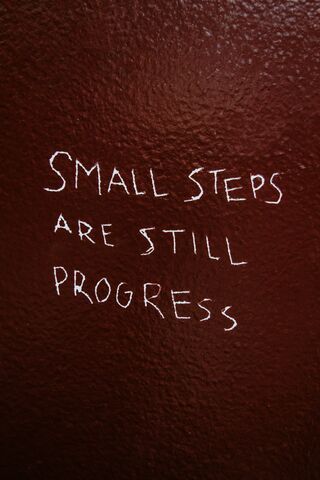Psychology
Captain Tom and Climate Change: The Psychology of Small Steps
How can you get started on climate action? Start small for big results.
Posted March 30, 2021 Reviewed by Devon Frye
Key points
- The psychology of small steps or small wins may be a key to climate action. Building confidence and capacity with initial small successes can lead to big results.
- When it comes to climate change, ask yourself: Are your values and your actions aligned? Answering this simple question may help start your next steps for climate action.
- If you're going to do only one thing about the climate crisis, talk about climate issues within your circles of influence. Be a climate communicator.
Captain Tom Moore was worried. Although he was hobbled and using a walker, the 99-year-old British WWII veteran wasn’t worried about himself. He was worried about the National Health Service (NHS), as he sat watching the COVID-19 pandemic unfold in Great Britain,
Captain Tom was concerned that the NHS might be overwhelmed. Captain Tom was worried, but he had an idea that might help.
Captain Tom’s 100th birthday was coming up—a little more than a month away. What if he had a fund-raiser for the National Health Service to celebrate his 100th birthday? After talking the idea over with his daughter and his grandson, Captain Tom Moore set his goal: He would raise 1,000 British pounds (about $1,400) by walking around his garden 100 times for his 100th birthday. Despite his afflictions, he thought he could do it and he wanted to try.
You probably know the rest of the story by now. Captain Tom blew through his initial goal and eventually raised more than $40 million, earning him a spot in the Guinness Book of World Records as the leading individual fund-raiser. For his leadership and impact, Queen Elizabeth knighted him at Windsor Castle.
What was Captain Tom’s secret for success?
What Is Perceived Self-Efficacy?
More than forty years ago, the psychologist Albert Bandura highlighted the importance of self-efficacy as a key element in human motivation, well-being, and accomplishments (Bandura, 1977). For Bandura, perceived self-efficacy encompasses “beliefs in one’s capabilities to organize and execute the courses of action required to manage prospective situations” (Bandura, 1995, p. 2). Within Bandura’s theory, this set of beliefs shape our thoughts, motivation, affect, and behavior.
I don't know whether or not Captain Tom even knew the term self-efficacy, but his fundraising campaign reflected his strong belief that he could organize himself and his actions to make a difference. And what a difference he made for the NHS.
The Psychology of Small Steps
Jonah Berger, a marketing professor at the University of Pennsylvania’s Wharton School, recently outlined important steps for changing behavior (Berger, 2020). These steps, along with self-efficacy, may also have been keys to Captain Tom Moore’s success.
Berger suggested three key elements:
- highlighting a values/behavior gap
- asking a question to encourage reflection
- asking for a smaller change to begin

In Captain Tom’s case, each of these elements likely played a role. It appears to have all started with Captain Tom’s discomfort: he wanted to help the NHS, but he hadn’t done anything (a values/behavior gap). Starting with his own reflection and then in conversation, he asked a simple question: How might I help? And he set a modest goal, literally starting with many small steps (10 garden laps a day for 10 days). He didn’t set out to achieve a major fund-raising milestone; he simply wanted to make a small contribution.
Why Small Steps Are the Keys to Success
I thought about Captain Tom and Professor Berger recently when I was asked to give a talk about the climate crisis. There is a parallel between the climate crisis and the COVID-19 pandemic. (Mosley, 2020). Both are global challenges, requiring global responses. And both can leave us feeling overwhelmed: What can one person do?
The first step is acknowledging the problem, and most of us do. The United Nations Development Program (UNDP) recently released "The People’s Climate Vote," the largest survey of public opinion on climate change ever conducted (UNDP, 2021). The survey reached 1.22 million people in 50 countries across the globe, representing 56 percent of the world’s population.
Respondents were asked their opinion of the urgency of climate action and the priority for action in 18 different policy areas. In the U.S., 61 percent of those 60 and over expressed a belief in the climate emergency; 75 percent of those under 18 expressed a belief in the climate emergency.
A second step is to envision collective action—larger-scale action in response to the climate emergency. Here, again, the U.S. respondents indicated strong support for several policy options:
- 65 percent support solar, wind, and renewable energy power
- 57 percent support more investment in the green economy and jobs
- 57 percent support making companies pay for their pollution
- 46 percent support requiring companies to communicate on how their products are made
- 71 percent support keeping oceans and waterways healthy
- 56 percent support using more clean electric cars and buses or bicycles
- 61 percent support reducing food waste
- 55 percent support wasting less energy in homes, buildings, and factories
Only 4 percent of respondents from the U.S. indicated no support for any policy. Within this strong support for action, there were also important gender differences: In the U.S., 11 percent more women and girls expressed a belief in the climate emergency than did men and boys.
The next step is to ask ourselves and others to reflect on the gap between our values and our behavior: have we acted on our support for action? Climate scientist Katharine Hayhoe suggests that the most important thing we can do to fight climate change is to talk about it with people in our circles of influence (Hayhoe, 2018).
Finally, what is a small win we could achieve: talking with family members and friends about climate concerns? Making one call or writing one postcard to an elected official? Reducing our fuel use one day per week? Eating meat one less time per week?

How Small Steps Lead to Big Results
In Growing Greener's climate work, we have seen the impact of the psychology of small wins. For example, we worked with the first church of Swampscott, a Congregational church outside of Boston, to start conversations about the members' response to the climate crisis. About 30 people came to the initial session, a potluck lunch after Sunday services. Each person set a small personal goal. At the same time, the group members were amazed that there were so many other people who shared their climate concerns; they had no idea that there were so many kindred spirits.
After six months, the lay leader in the church effort, Gordon Angel (his real name!), was a bit downhearted. He felt like they were not making much progress: They had changed all the light bulbs in the church to LED lights and they were discussing installing solar panels on the roof. The following January, Gordon emailed me a photo: they had just switched on the solar panels. Now the church is saving money, reducing its carbon footprint, and offering an example of sustainability for the community.
The solar installer commented on the quick process of approval and installation. Usually, he said, it takes church groups much longer to make a decision and get things done. What was their secret? Gordon thought for a moment and then replied: "We did start with a small workshop that showed us how many people were concerned. The workshop's small steps allowed the church to begin to envision and accomplish larger goals. But it all started with small, individual wins."
So if you think your small efforts won’t make a difference, remember the solar panels or remember Captain Tom and his small steps. By the way, Captain Tom also won another spot in the Guinness Book of World Records, this one for the oldest person to record a #1 hit. How? With a remake of a popular song: "You’ll Never Walk Alone."
References
Bandura A. (1977) Self-efficacy: Toward a unifying theory of behavioral change. Psychological Review. 84:191–215.
Bandura A. (1995) Exercise of personal and collective efficacy in changing societies. In: Bandura A, editor. Self-efficacy in changing societies. Cambridge University Press; Cambridge, UK: pp. 1–45.
Berger, J. (2020). How to persuade people to change their behavior. Harvard Business Review, April 20. Available at https://hbr.org/2020/04/how-to-persuade-people-to-change-their-behavior
Hayhoe, K. (2018). What’s the most important thing you can do to fight climate change? Talk about it. TedWomen 2018. Available at https://bit.ly/39nbdoO
Mosley, T. (2020). Two American crises: The parallels between climate change and the pandemic. WBUR. Sept. 21. Available at https://www.wbur.org/hereandnow/2020/09/21/climate-change-coronavirus-p…
United Nations Development Program and The University of Oxford (2021). Peoples’ Climate Vote Results. January 26. Available at https://bit.ly/3r7ZBNr




